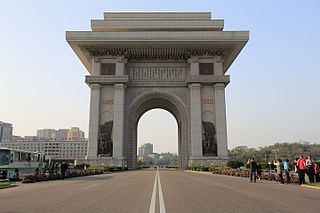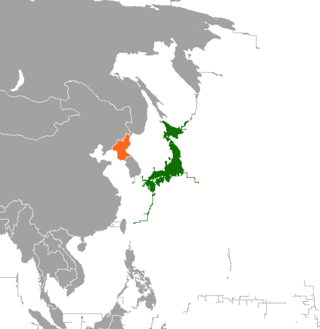The Eight Views of Korea are a collection of places that are considered to capture the beauty of Korea. The concept of Eight Views is shared across East Asia, with the example of the Eight Views of Xiaoxiang during the Song dynasty of China.
The Eight Views of Korea are a collection of places that are considered to capture the beauty of Korea. The concept of Eight Views is shared across East Asia, with the example of the Eight Views of Xiaoxiang during the Song dynasty of China.
The Eight Views of Korea are a collection of the beautiful scenery of Korea, that are now understood to be as follows:
These Eight Views were sung in a popular song called "the Song of the Eight Views of Korea".[ citation needed ]

Pyongyang is the capital and largest city of the Democratic People's Republic of Korea (DPRK), commonly known as North Korea, where it is sometimes labeled as the "Capital of the Revolution". Pyongyang is located on the Taedong River about 109 km (68 mi) upstream from its mouth on the Yellow Sea. According to the 2008 population census, it has a population of 3,255,288. Pyongyang is a directly administered city with a status equal to that of the North Korean provinces.

Kim Jong Il was a North Korean politician who was the second supreme leader of North Korea. He led North Korea from the death of his father Kim Il Sung in 1994 until his death in 2011, when he was succeeded by his son, Kim Jong Un. Afterwards, Kim Jong Il was declared Eternal General Secretary of the Workers' Party of Korea (WPK).

The contemporary culture of North Korea is based on traditional Korean culture, but has developed since the division of Korea in 1945. Juche, officially the Juche idea, is the state ideology of North Korea; It is considered a variation of Marxist-Leninism. Juche displays Korea's cultural distinctiveness as North Korea is the creator and sole adopter of the ideology.
The music of North Korea includes a wide array of folk, popular, light instrumental, political, and classical performers. Beyond patriotic and political music, popular music groups like Pochonbo Electronic Ensemble and Moranbong Band perform songs about everyday life in the DPRK and modern light pop reinterpretations of classic Korean folk music. Music education is widely taught in schools, with President Kim Il Sung first implementing a program of study of musical instruments in 1949 at an orphanage in Mangyongdae. Musical diplomacy also continues to be relevant to the Democratic People's Republic of Korea, with musical and cultural delegations completing concerts in China and France in recent years, and musicians from Western countries and South Korea collaborate on projects in the DPRK.

The Rungrado 1st of May Stadium is a multi-purpose stadium occupying an area of 20.7 hectares on Rungra Island, Pyongyang, North Korea. It opened on 1 May 1989, with its first major event being the 13th World Festival of Youth and Students. It is the second largest stadium in the world by seating capacity, after Narendra Modi Stadium. The stadium can officially hold up to a maximum of 114,000 spectators.

Kang Chol-hwan is a North Korean defector, author, and the founder and president of the North Korea Strategy Center.

Kim Jong Suk was a Korean revolutionary, anti-Japanese guerrilla, Communist activist, the first wife of North Korean leader Kim Il Sung, the mother of former leader Kim Jong Il and grandmother of current leader Kim Jong Un.

The Grand Mass Gymnastics and Artistic Performance Arirang, also known as the Arirang Mass Games, or the Arirang Festival is a mass gymnastics and artistic festival held in the Rungrado 1st of May Stadium in Pyongyang, North Korea. The games usually take place in August or September. The Arirang Mass Games were held annually between 2002 and 2013, with the exception of 2006. After a five-year hiatus, Mass Games returned for a performance entitled 'The Glorious Country' in 2018.

Mass games or mass gymnastics are a form of performing arts or gymnastics in which large numbers of performers take part in a highly regimented performance that emphasizes group dynamics rather than individual prowess.

Pak Song-chol or Park Sung-chul was a North Korean politician who served as Premier of North Korea from 1976 to 1977. He succeeded Kim Il. He also served as foreign minister from 1959 to 1970.

Pyongyang Sports Club is a North Korean organization of education specialty with several departments. This organization is based in Pyongyang and plays at the Kim Il Sung Stadium. As the sports club of the Workers' Party of Korea and Government of Pyongyang, Pyongyang SC is the largest sports club not affiliated with a state ministry.

Kim Il Sung was a North Korean politician and the founder of North Korea, which he led as Supreme Leader from the country's establishment in 1948 until his death in 1994. Afterwards, he was succeeded by his son Kim Jong Il and was declared Eternal President.
The Eight Views of Pyongyang are a collection of beautiful scenery of Pyongyang, Korea, that are alleged to have been handed down from the time of the Joseon dynasty, in the Korean poetry and paintings.

Pyongyang station is the central railway station of P'yŏngyang, North Korea. It is located in Yŏkchŏn-dong, Chung-guyŏk.

Rungra Island is an island in Pyongyang, North Korea, located in the middle of the Taedong River. Its total area is 1.3 square kilometres (0.50 sq mi). The Chongryu Bridge on the north side and the Rungra Bridge on the south side connect the island to the rest of Pyongyang. Some of the Eight Views of Pyongyang can be seen from the island.

Japan–North Korea relations refers to international relations between Japan and North Korea. Relations between Japan and North Korea have never been formally established, but there have been diplomatic talks between the two governments to discuss the issue of kidnapped Japanese citizens and North Korea's nuclear program. Relations between the two countries are severely strained and marked by tension and hostility. According to a 2014 BBC World Service poll, 91% of Japanese people view North Korea's influence negatively, with just 1% expressing a positive view; the most negative perception of North Korea in the world.

Kim Il Sung died of a heart attack in the early morning of 8 July 1994 at age 82. North Korea's government did not report the death for more than 34 hours after it occurred. An official mourning period was declared from 8–17 July, during which the national flag was flown at half mast throughout the country, and all forms of amusement and dancing were prohibited.

Reminiscences: With the Century is the autobiography of Kim Il Sung, founder and former president of North Korea. The memoirs, written in 1992 and published in eight volumes, retell Kim's life story through his childhood to the time of Korean resistance. Initially, a total of 30 volumes were planned but Kim Il Sung died in 1994 after just six volumes; the seventh and eight volumes were published posthumously. The work reveals early influences of religious and literary ideas on Kim's thinking. An important part of North Korean literature, With the Century is held as an intriguing if unreliable insight into the nation's modern history under late colonial Korea. The book is considered one of a few North Korean primary sources widely available in the West and as notable research material for North Korean studies.

The Ulmil Pavilion (Korean: 을밀대) is an historic structure located on Moran Hill in Pyongyang, North Korea.

Song Yi-kyun was a Korean-American activist in the Korean independence movement.